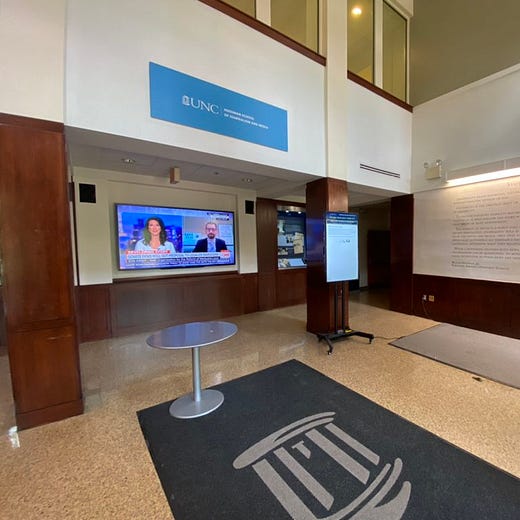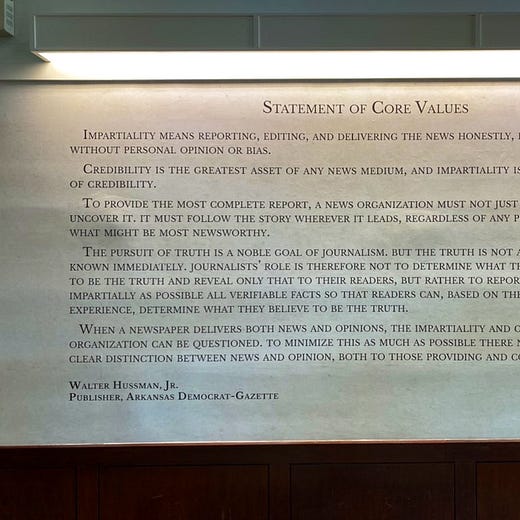E-Pluribus | July 14, 2021
Justin Trudeau attacks free speech, punitive intolerance is no way to preserve pluralism, and teachers' unions gaslight on CRT.
A round up of the latest and best writing and musings on the rise of illiberalism in the public discourse:
Michael Taube: Justin Trudeau Attacks Free Speech Again
While we may quibble often over free speech issues, few other countries have as strong protections as the United States. For instance, our neighbors to the north have passed laws banning hate speech, a restriction their highest court affirmed, unlike our own Supreme Court. Using that precedent, the Canadian government is now trying to police hate speech online. Michael Taube writes at the Wall Street Journal:
On June 23, however, Mr. Trudeau’s government introduced Bill C-36, which would amend the Criminal Code and the Canadian Human Rights Act by toughening provisions against online hate speech. The bill illustrates the difficulties in establishing such an offense. It would define hate speech as “communication that expresses detestation or vilification of an individual or group of individuals on the basis of a prohibited ground of discrimination.”
But then comes a putative clarification: “For greater certainty, the content of a communication does not express detestation or vilification . . . solely because it expresses mere dislike or disdain or it discredits, humiliates, hurts or offends.” By what objective standard could a court or a human-rights tribunal distinguish between “detestation” and mere humiliation?
Bill C-36 is an attempt to bring back the controversial Section 13 of the Canadian Human Rights Act, which was repealed in 2013. That provision, which prohibited online speech “likely to expose a person or persons to hatred or contempt,” was condemned as a violation of free speech—not only by figures on the right like Messrs. Steyn and Levant but by the Canadian Civil Liberties Association and leftist U.S. linguist Noam Chomsky, who called it “outrageous.”
At a recent press conference, Justice Minister David Lametti claimed Bill C-36 would be “more narrow than the original section 13.” It doesn’t seem like it.
Read the full piece at the WSJ.
David French: Punitive Intolerance Is No Way to Preserve Pluralism
Barronelle Stutzman operated a floral arrangement shop in Washington state. She was sued by the state’s attorney general after she refused to make a floral arrangement for a same-sex wedding, citing her strong religious beliefs. Barronelle had known Robert Ingersoll, the customer requesting the floral arrangement, for years and helped him find another business to make the arrangement for his wedding, but that didn’t stop the state from seeking to punish Stutzman for discrimination. The Supreme Court declined to take up her case after the Washington Supreme Court ruled against her. At The Dispatch, David French examines Stutzman’s case, the fine legal line that exists between civil rights and religious liberty, and how far the state should go to punish intolerance:
Let’s pause here for a moment. In a tolerant and decent pluralistic society, this is where the matter should have ended. Barronelle acted in accordance with the dictates of her conscience, she helped Ingersoll obtain all the floral services he needed, and he was flooded with public support. There was no real harm.
[ . . . ]
The tragedy here is not for the law. Not yet. There will be other, similar cases before the court in coming years—perhaps even cases with “cleaner” facts. The tragedy is for Barronelle. A kind, brave woman fought hard against punitive intolerance, and she likely ultimately lost for reasons that have less to do with her actions and more to do with the way that SCOTUS chooses to shepherd and shape constitutional jurisprudence.
And this brings us back to the original sin of the case, the litigation that started it all. Barronelle now faces financial ruin—because a public official exercised his discretion to be unnecessarily and gratuitously punitive. He should relent. He should learn a lesson, ironically enough, from Justice Anthony Kennedy, author of Obergefell, who wrote in that very opinion these wise words:
Finally, it must be emphasized that religions, and those who adhere to religious doctrines, may continue to advocate with utmost, sincere conviction that, by divine precepts, same-sex marriage should not be condoned. The First Amendment ensures that religious organizations and persons are given proper protection as they seek to teach the principles that are so fulfilling and so central to their lives and faiths, and to their own deep aspirations to continue the family structure they have long revered.
Barronelle lost her long fight. It was not a fight of hate, but of conviction. She should be applauded, not destroyed.
Read the full piece here.
Christine Rosen: Teachers’ Unions Deceive on Critical Race Theory
We have continued to chronicle the ongoing debate about whether state bills attempting to ban the teaching of Critical Race Theory (CRT) in public schools go too far or even achieve their desired ends of curtailing the excesses of CRT and CRT-adjacent ideas. What hasn’t really been questioned is whether some schools are engaged in CRT or so-called “anti-racist” curriculum. But recently, as Christine Rosen points out at Commentary Magazine, the national American Federation of Teachers and its president Randi Weingarten have denied that CRT is even an issue.
Just as Weingarten and the union she represents have tried to gaslight the public into believing that the unions had nothing to do with prolonged school closures during the past year (In her speech, Weingarten made sure to blame Donald Trump and Betsy DeVos for school closures, despite the fact that Trump had called for schools to reopen), now she’s claiming that questionable theories about race and race relations that fall under the general umbrella of critical race theory are merely figments of the conservative imagination.
The media actively encourages this narrative: A Washington Post story about Weingarten’s remarks described parents’ concerns about CRT as a “backlash” and implied that it is overblown: “Conservative activists have seized on images of assignments or short clips of video classes to argue that teachers are indoctrinating students with critical race theory, which they call divisive and inappropriate for schoolchildren.”
[ . . . ]
And although the public has only recently noticed the energy of CRT advocates’ efforts at the K-12 level, critical theory has been rampant in higher education for some time. As Robby Soave noted in Reason, although progressives are correct to lament the overly broad claims by some conservatives about what is and is not “critical race theory,” there can be no doubt that some questionable things are being taught to K-12 school children, and with enthusiastic union support.
Even the Washington Post conceded that “Weingarten’s advocacy comes shortly after the National Education Association, the country’s largest teachers union, passed a resolution asking its members to ‘fight back against anti-[critical race theory] rhetoric.’” Indeed, one of the National Education Association’s New Business Items at its recent conference (which the union later quietly removed from its website), resolved that “It is reasonable and appropriate for curriculum to be informed by academic frameworks for understanding and interpreting the impact of the past on current society, including critical race theory.”
The union also vowed to disseminate a study “that critiques empire, white supremacy, anti-Blackness, anti-Indigeneity, racism, patriarchy, cisheteropatriarchy, capitalism, ableism, anthropocentrism, and other forms of power and oppression at the intersections of our society.” The resolution further stated that the union will “join with Black Lives Matter at School and the Zinn Education Project to call for a rally this year on October 14 — George Floyd’s birthday — as a national day of action to teach lessons about structural racism and oppression.” As Soave notes correctly, “If the NEA asserts that CRT is a much broader concept—encompassing anti-capitalism and anti-ableism—and a vital tool for fostering ‘honesty’ in K-12 education, the organization is essentially validating conservative parents’ concerns.”
Read it all here.
Around Twitter
Something is happening at the University of North Carolina Chapel Hill’s school of journalism:
Glenn Greenwald on two Amazon employees who have resigned from the company in protest.
“Illiberals on the right and left have much in common”:













